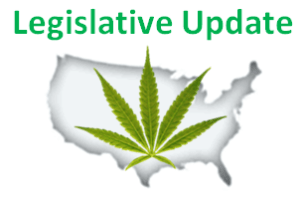An increasing number of medical cannabis dispensaries are losing their coveted bank accounts simply because they’re depositing too much cash, too frequently.
The development presents yet another major challenge to doing business in an industry beset by numerous challenges, creating a situation in which the bigger the dispensary is, the more scrutiny it faces – making it a victim of its own success.
Unfortunately, there’s not much dispensaries can do about it, given that major credit card companies have blocked out the industry. While some dispensaries still take plastic by using alternative – and legally questionable – services or obscuring the true nature of the business, most have been forced to adopt an all-cash model. Dispensaries must therefore handle large amounts of cash each day and then bring it to the bank (if they’re lucky enough to have an account in the first place), sometimes every week or even every day.
Many centers are bringing in thousands – or even tens of thousands – of dollars at a time, often in relatively small bills.
The dwindling number of banks that service the industry aren’t exactly thrilled with having to count, sort and deposit such large sums on a regular basis – or deal with the accompanying security and logistical risks. Additionally, banks have to report particularly large cash deposits (over $10,000) to the feds – which eats up time and resources when it happens on a regular basis.
As a result, some banks eventually determine that it isn’t worth the hassle or risk. In other cases, the cash transactions raise red flags, and banks discover that they were misled into thinking the account was for another type of a business (a wellness clinic, a health products provider, even a flower shop).
“We visit a lot of dispensaries on a daily basis, and we’re finding that this has become a very common experience,” said Kim Sullivan, owner of Aztec ATM, which offers a point-of-banking system that essentially lets MMJ centers accept electronic payments from customers via ATM and debit cards. “We just saw this happen to a dispensary yesterday. The banks seem to have gotten more aggressive since July of last year, when the federal government stepped up the pressure on them and forced them to get to know their customers better, which was a subtle way to threaten the banks with the loss of their charter.”
Sullivan said banks will turn their heads for a while, but eventually the large cash deposits become an issue and they shut down accounts with little warning.
Dispensaries that lose their bank accounts are forced to keep piles and piles of cash on hand, creating huge security problems and operational issues.
The problem is particularly severe in Washington State, California and – more recently – Colorado, although dispensaries in other states have been affected as well.
Lance Ott – a principal of Guardian Data Systems,which provides financial services to high-risk merchants including dispensaries – said the trend started several years ago but has escalated as of late and now seems to be occurring “everywhere.”
“It’s more of a legal question/issue with the banks,” Ott said. “The feds have in one case asked a bank in (Northern California) to implement expensive and sophisticated reporting systems designed to track incoming funds.”
Kris Krane, managing partner of the Phoenix consultancy 4Front Advisors, said he hasn’t heard of it happening in Arizona yet, likely because the industry is so new there (dispensaries just started opening up over the last six months). Rather, the big issue for dispensaries in Arizona is getting a bank account in the first place. Still, Krane said he has heard anecdotal evidence of banks closing dispensary accounts because of large cash deposits in other areas and says it’s only a matter of time before the problem crops up in new MMJ states.
“It’s a major problem,” Krane said, “and I expect it to get worse as more and more states adopt these laws.”




